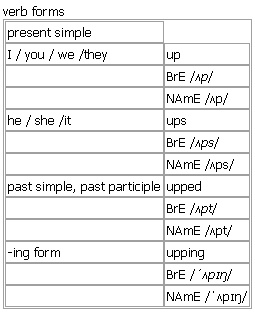|
Từ điển Oxford Advanced Learner 8th
 up
up

up adverb, preposition, adjective, verb, noun BrE [ʌp] NAmE [ʌp]
adverb For the special uses of up in phrasal verbs, look at the entries for the verbs. For example break up is in the phrasal verb section at break.
1. towards or in a higher position
• He jumped up from his chair.
• The sun was already up (= had risen) when they set off.
•They live up in the mountains.
•It didn't take long to put the tent up.
•I pinned the notice up on the wall.
•Lay the cards face up (= facing upwards) on the table.
•You look nice with your hair up (= arranged on top of or at the back of your head).
•Up you come! (= said when lifting a child)
2. to or at a higher level
• She turned the volume up.
• Prices are still going up (= rising).
•United were 3–1 up at half-time.
•The wind is getting up (= blowing more strongly).
•Sales are well up on last year.
3. to the place where sb/sth is
• A car drove up and he got in.
• She went straight up to the door and knocked loudly.
4. to or at an important place, especially a large city
• We're going up to New York for the day.
• (BrE, formal) His son's up at Oxford (= Oxford University).
5. to a place in the north of a country
• They've moved up north.
• We drove up to Inverness to see my father.
6. into pieces or parts
• She tore the paper up.
• They've had the road up (= with the surface broken or removed) to lay some pipes.
•How shall we divide up the work?
7. completely
• We ate all the food up.
• The stream has dried up.
8. so as to be formed or brought together
• The government agreed to set up a committee of inquiry.
• She gathered up her belongings.
9. so as to be finished or closed
• I have some paperwork to finish up.
• Do your coat up; it's cold.
10. (of a period of time)finished; over
• Time's up. Stop writing and hand in your papers.
11. out of bed
• I stayed up late (= did not go to bed until late) last night.
• (BrE) He's up and about again after his illness.
12. (informal)used to say that sth is happening, especially sth unusual or unpleasant
• I could tell something was up by the looks on their faces.
•What's up? (= What is the matter?)
•What's up with him? He looks furious.
•Is anything up? You can tell me. In NAmE What's up? can just mean ‘What's new?’ or ‘What's happening?’ There may not be anything wrong.
Word Origin:
Old English up(p), uppe, of Germanic origin; related to Dutch op and German auf.
Language Bank:
increase
Describing an increase
▪ Student numbers in English language schools in this country increased ▪ from 66 000 in 2008 to just over 84 000 in 2009.
▪ The number of students increased ▪ by almost 30% compared with the previous year.
▪ Student numbers shot up ▪ / increased dramatically ▪ in 2009.
▪ The proportion of Spanish students rose sharply ▪ from 5% in 2008 to 14% in 2009.
▪ There was a significant rise ▪ in student numbers in 2009.
▪ The 2009 figure was 84 000, an increase of ▪ 28% on the previous year.
▪ The 2009 figure was 84 000, 28 per cent up ▪ on the previous year.
▪ As the chart shows, this can partly be explained by a dramatic increase ▪ in students from Spain.
Language Banks at ↑expect, ↑fall, ↑illustrate, ↑proportion
Example Bank:
•What's up with him? He looks furious.
•What's up? Are you OK?
Idioms: ↑not be up to much ▪ ↑on the up ▪ ↑on the up and up ▪ ↑up against something ▪ ↑up and down ▪ ↑up and down something ▪ ↑up and running ▪ ↑up before somebody ▪ ↑up for something ▪ ↑up sticks ▪ ↑up there ▪ ↑up to somebody ▪ ↑up to something ▪ ↑up yours! ▪ ↑ups and downs
preposition
1. to or in a higher position somewhere
• She climbed up the flight of steps.
• The village is further up the valley.
2. along or further along a road or street
• We live just up the road, past the post office.
3. towards the place where a river starts
•a cruise up the Rhine
Word Origin:
Old English up(p), uppe, of Germanic origin; related to Dutch op and German auf.
adjective
1. only before noun directed or moving upwards
•an up stroke
•the up escalator
2. not before noun (informal)cheerful; happy or excited
•The mood here is resolutely up.
3. not before noun (of a computer system)working
•Our system should be up by this afternoon.
Word Origin:
Old English up(p), uppe, of Germanic origin; related to Dutch op and German auf.
verb (-pp-)
1. intransitive up and… (informal or humorous)to suddenly move or do sth unexpected
•He upped and left without telling anyone.
2. transitive ~ sth to increase the price or amount of sth
Syn: ↑raise
•The buyers upped their offer by £1 000.
more at raise/up the ante at ↑ante
Verb forms: 
Word Origin:
Old English up(p), uppe, of Germanic origin; related to Dutch op and German auf.
noun
Word Origin:
[up] Old English up(p), uppe, of Germanic origin; related to Dutch op and German auf.
See also: ↑pull up stakes ▪ ↑up to doing something ▪ ↑up until something
|
|
|
▼ Từ liên quan / Related words
Related search result for "up"
|
|
